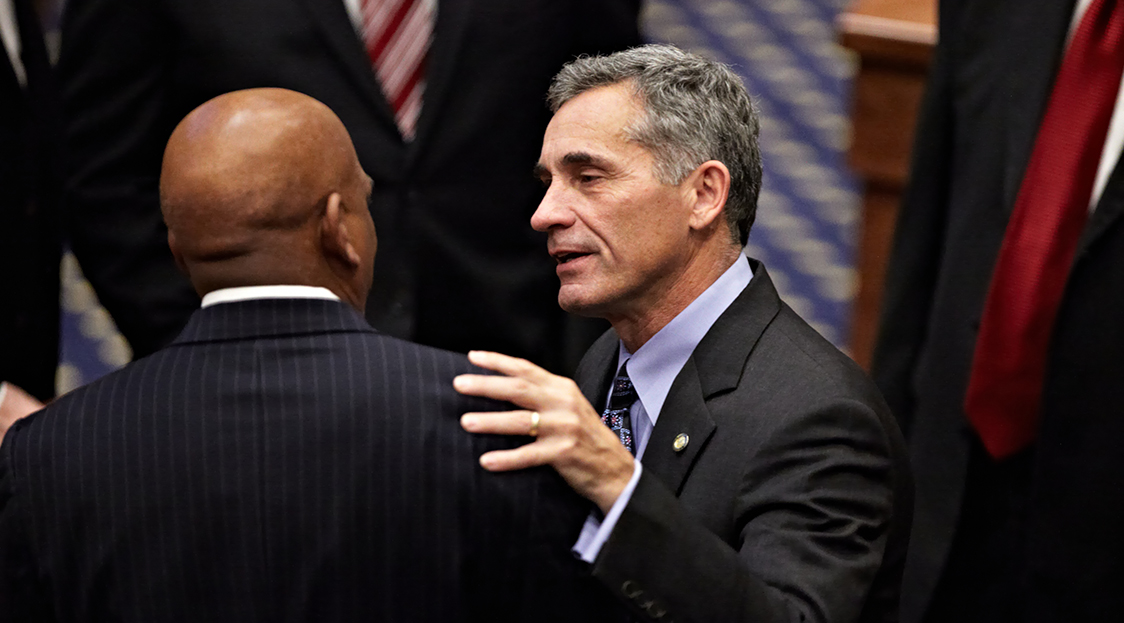Education will get a fresh look in 2016 session
By Allison Griffin
Senate President Pro Tem Del Marsh, in looking ahead to the 2016 legislative session that begins Feb. 2, predicts at least one familiar issue will surface.
State agencies will say they don’t have enough money, after last year’s budget that cut several agencies’ budgets by 5.5 percent. This year, he thinks they will be level-funded, and that “more streamlining will be the plan.”
Marsh believes the downsizing of state government has made a big impact on personnel costs, but “I still think there’s some right-sizing to go.”
Marsh, R-Anniston, said most of that downsizing has come through attrition. “We haven’t gone out and fired anybody,” he said in an interview at his State House office. And he thinks the cuts aren’t affecting state services: “After all the cuts we’ve made this past year, we have not heard an outcry of the public saying, ‘we’ve lost our services, we need more government.’”
This session, Marsh is most interested in education – specifically, to find a way to raise teacher pay and hire more teachers in subjects that are hard to fill, like science and bilingual education.
He says it’s important for Alabama to make a statement that we value education here. Of course, there will be a cost.
“Based on polling we’ve done, taxpayers are fine with raising teacher pay, but they want accountability as part of that measure,” he says. “So I think you’re going to see an element of tenure reform in that legislation.”
And attracting good teachers to rural areas is also on his radar. “We want to make sure money is available in the state to encourage those teachers to move into those areas.”
Other issues Marsh sees ahead for the 2016 regular session:
Gasoline tax. Gov. Robert Bentley supports an increase in the gas tax to improve roads and bridges, and with gas prices remaining low, such an increase may get traction in the legislature.
A House committee voted in August to approve a hike in the state’s approximately 21-cents-a-gallon tax by 5 cents, according to al.com. But the measure stalled as legislators looked at other revenue sources, including a cigarette tax increase that lawmakers approved in September.
And Alabama’s small towns and rural areas should be protected, Marsh says, with components in any gas tax measure put in place to ensure those areas get a share in the funds.
Payday lending. Marsh expects a new look at the payday lending industry, now that the state banking department has more data on how many loans are being made, the number of loans in dollars and the frequency of those loans. The state Supreme Court ruled in 2015 that the banking department could establish a payday loan database; payday lenders had sued the department in 2013 to block creation of the system.
An Associated Press story in October reported that the database showed people took out 462,209 loans over a 10-week period. A total of $146 million was borrowed, or an average of about $14 million each week.
Critics say payday loans trap low-income borrowers in a cycle of debt from which they can’t recover, due to interest rates that can be as high as 456 percent. Alabama has about 900 payday lenders, according to the AP.
Marsh was careful to say that the legislators will want to hear from the banking department before jumping into any new push for regulation. “We’re going to hear their analysis of the industry. And if something needs (to be) fixed, and I’m not saying there is, we’re going to look at it.”
Gambling legislation. One issue he won’t be pushing this session is gaming. Marsh proposed a constitutional amendment in the 2015 session that would have created a lottery and legalized casino-type gambling at four locations in the state, which would be taxed. He commissioned an AUM study that showed the benefits of gambling in the state in terms of revenue; last spring, legislators were scrambling to address a General Fund budget shortfall that was expected to be $260 million.
“The discussion was to raise taxes on the people of the state,” he says now. “I said, before we raise taxes, I think we need to look at gaming legislation and consider it, especially since it goes to the people for a vote before that decision is made.”
But the proposal didn’t find a lot of support. Marsh started talking to his colleagues this fall, and says he does not see the votes in the Senate to start a fresh push on gaming. Legislators are welcome to look at pieces of his proposal – either the lottery or the casino gambling – if they want to tackle either issue. But he thinks the package as a whole makes more sense, in terms of economic development and job creation.
After finding little support for gaming, Marsh says he decided to focus on the education piece for this session. “I’ve got to focus on what I think I can get done.”





